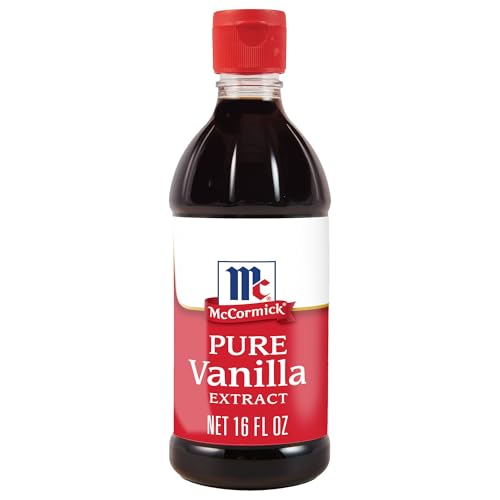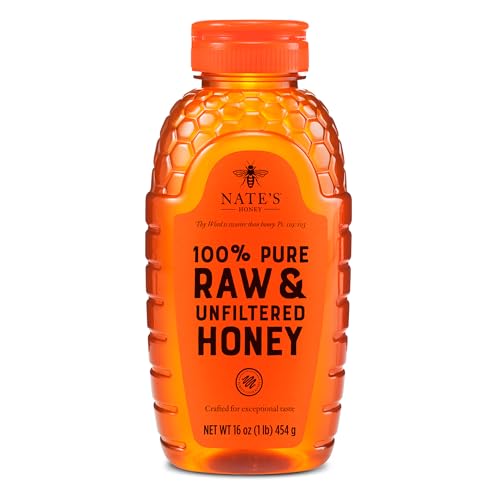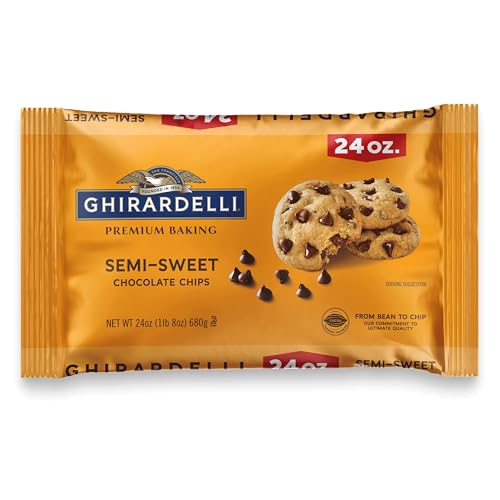Slow Cooker Recipes: Easy Meals, Less Effort!
Family-friendly dishes for busy people — quick prep, delicious results.
Grab yours for $4Are you a non-coffee drinker curious about joining the millions who start their day with a cup of joe? You’re not alone! Many people want to enjoy coffee’s benefits but are put off by its bitter taste or strong reputation.
Coffee doesn’t have to be an acquired taste. With countless flavor options, brewing methods, and specialty drinks available today, there’s likely a coffee experience that can win over even the most reluctant palate. Whether you’re looking for a gentle introduction to caffeine or simply want to understand what all the fuss is about, exploring coffee-based beverages customized for beginners might surprise you with their approachability and delicious flavors.
Why Non-Coffee Drinkers Avoid Coffee
Many people steer clear of coffee even though its worldwide popularity. Understanding these objections helps bridge the gap between coffee enthusiasts and those who’ve yet to find their perfect cup. Let’s explore the most common reasons non-coffee drinkers avoid this beloved beverage.
Common Objections to Coffee
Bitterness tops the list of complaints among non-coffee drinkers. The natural bitter compounds in coffee beans create an intense flavor that can overwhelm untrained palates. Acidity presents another hurdle, as coffee’s natural acids can cause stomach discomfort for some individuals. The caffeine content deters many people who are sensitive to its effects or worry about developing dependency. Strong coffee aromas, described as “too intense” or “burnt,” often trigger negative reactions before the first sip. Texture issues also arise for those who dislike the mouthfeel of coffee, finding it either too watery or too thick depending on preparation methods.
Misconceptions About Coffee
Non-coffee drinkers frequently believe all coffee tastes the same, unaware of the vast flavor spectrum across different beans and brewing techniques. Many incorrectly assume coffee must be consumed black, not realizing the endless customization possibilities. Health concerns persist even though research showing moderate coffee consumption offers several benefits, including antioxidant properties. The notion that coffee is exclusively for morning consumption limits exploration of lighter afternoon varieties. Some people think quality coffee must be expensive or complicated to prepare, missing out on accessible brewing methods. Coffee culture intimidation keeps potential drinkers away, with specialized terminology and perceived snobbery creating unnecessary barriers to entry.
Gateway Coffee Drinks for Beginners
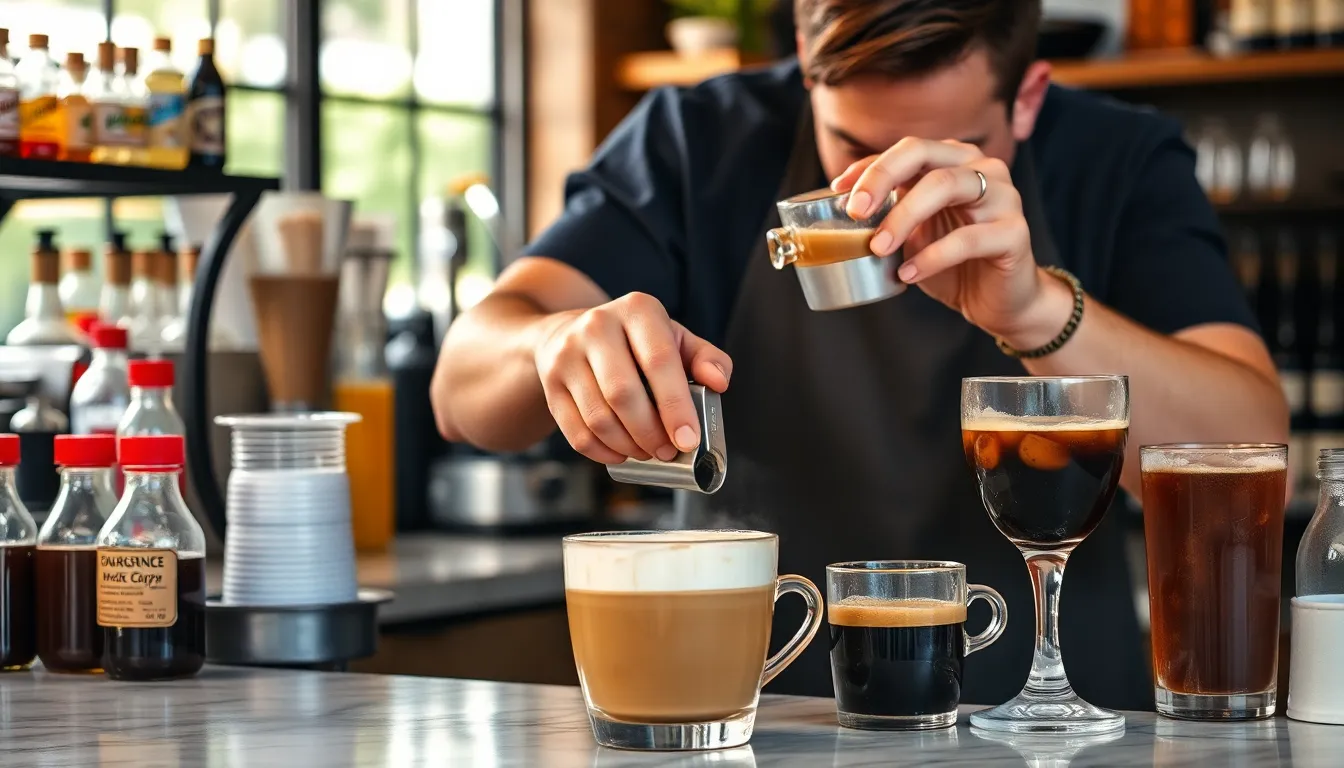
Mild and balanced coffee drinks serve as perfect entry points for those new to the coffee industry. Lattes combine espresso with steamed milk and foam, creating a seamless process that masks coffee’s natural bitterness. The creamy texture and subtle coffee flavor make lattes an ideal first step for beginners exploring coffee options.
Sweet Coffee Options
Sweet coffee beverages offer an approachable path for newcomers deterred by coffee’s bitter profile. Adding flavored syrups transforms ordinary coffee into delightful treats – vanilla and caramel lattes balance the espresso’s intensity with milk and sweetness. Many first-time coffee drinkers find success starting with “slightly sweet” options rather than jumping straight to black coffee. Cappuccinos blend equal parts espresso, steamed milk, and foam to deliver a balanced, creamy experience that’s less intimidating than pure espresso. The sweetness helps bridge the gap between familiar flavors and coffee’s complex taste profile, making these drinks perfect gateway options.
Cold Coffee Alternatives
Cold brew coffee presents a refreshing alternative for non-coffee drinkers hesitant to try hot, bitter brews. Steeped slowly in cold water, this method produces a smoother, less acidic beverage with milder flavor notes while still providing caffeine. Creative combinations like cold brew mixed with orange and mango juice plus ginger syrup offer exciting flavor profiles that barely resemble traditional coffee. Iced lattes provide another approachable option, especially during warmer months, delivering coffee’s energy boost in a more refreshing format. These cold alternatives often surprise non-coffee drinkers with their pleasant taste and lack of overwhelming bitterness, making them excellent introductory coffee experiences.
Coffee Varieties with Milder Flavors
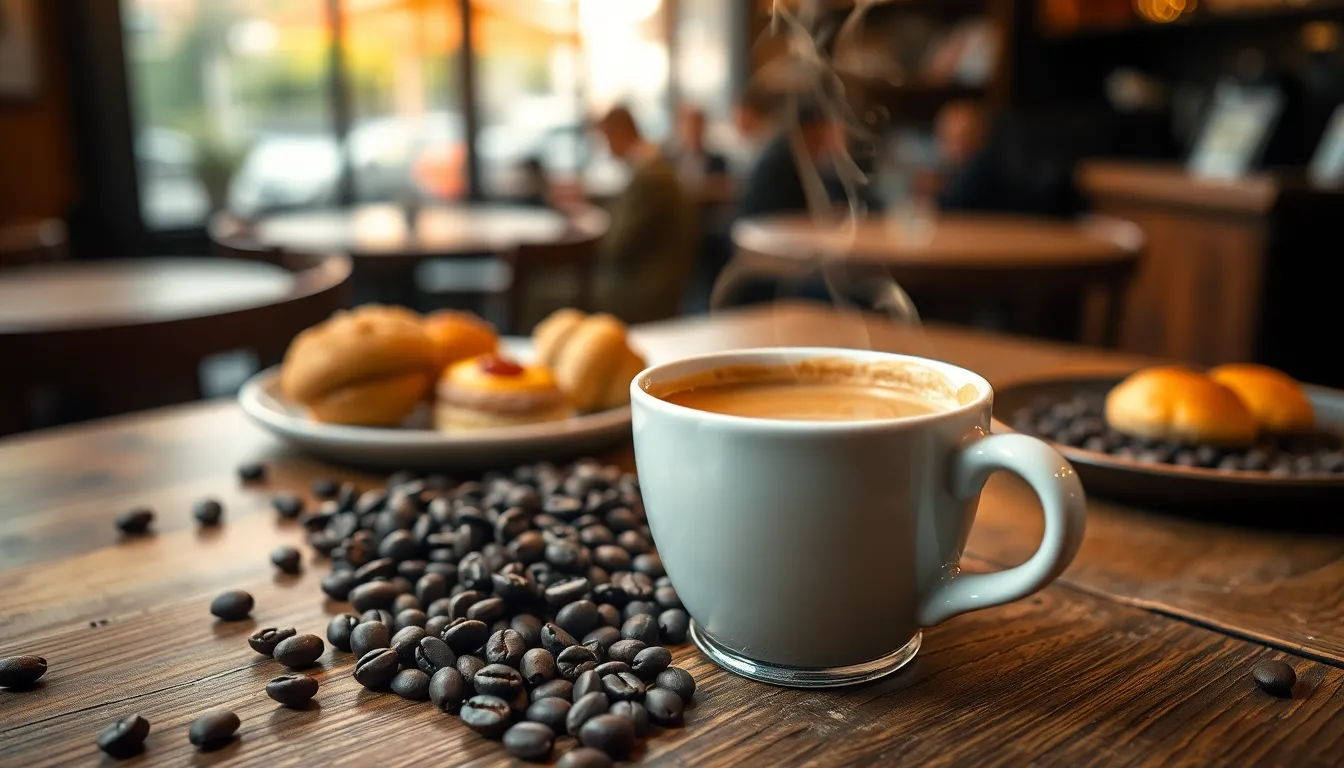
Coffee varieties with gentler flavor profiles offer perfect entry points for those new to coffee or sensitive to its traditional bitter notes. Several options cater specifically to milder taste preferences while still delivering the essence of what makes coffee special.
Light Roasts for Sensitive Palates
Light roasts present an ideal starting point for non-coffee drinkers due to their naturally smoother and less bitter characteristics. These roasts retain more of the coffee bean’s inherent flavors and subtle nuances that darker roasting processes typically eliminate. You’ll notice light roasts feature brighter, more vibrant taste profiles with pleasant acidity that comes across as refreshing rather than harsh. Their aromatic compounds remain largely intact, contributing delightful floral, fruity, and sweet notes that make each sip more approachable. Many first-time coffee drinkers find they can enjoy light roasts without adding sugar or cream, as these roasts lack the intense bitterness that typically necessitates such additions.
Specialty Beans with Unique Profiles
Specialty coffee beans offer remarkable flavor diversity that can transform your perception of what coffee tastes like. These premium beans are meticulously selected and often traceable to exact farms where careful cultivation and processing enhance their distinctive characteristics. Beans from Ethiopian highlands frequently showcase pronounced berry and citrus notes that appeal to those who typically avoid coffee. Central American varieties deliver pleasant nutty, chocolate, and caramel undertones that create a gentle introduction to coffee’s complex flavor spectrum. Specialty beans from regions like Colombia or Costa Rica often feature mild sweetness with minimal bitterness, making them particularly suitable for sensitive palates. Their unique flavor profiles stand out from standard commercial blends, providing an accessible gateway to appreciate coffee’s nuanced tastes without overwhelming bitterness.
How to Customize Coffee to Your Taste

Customizing coffee transforms it from an intimidating bitter brew into a personalized beverage that suits your unique preferences. Starting with milder options and gradually experimenting with various additions creates a coffee experience customized specifically to your taste buds.
The Art of Adding Milk and Cream
Milk and cream serve as perfect companions to soften coffee’s natural bitterness while adding richness and body. Adding dairy creates a smoother mouthfeel and reduces the intensity of strong coffee flavors, making each sip more approachable. Flavored creamers in varieties like hazelnut, caramel, and vanilla can turn your coffee into a dessert-like treat without the need for a coffee shop visit. Non-dairy alternatives such as oat milk, almond milk, or coconut milk offer similar bitterness-cutting benefits with their own unique flavor profiles. Statistics show approximately two-thirds of coffee drinkers regularly add creamer to enhance flavor, confirming you’re in good company when doctoring your cup.
Flavor Enhancements and Syrups
Sweeteners and flavored syrups provide an effective way to transform coffee’s natural profile into something more palatable for beginners. Adding sugar, honey, or maple syrup counters bitterness while improving coffee’s natural caramel notes. Flavored syrups like mocha, toffee nut, or vanilla introduce familiar, comforting tastes that complement coffee’s complexity without overwhelming your palate. Approximately 74% of coffee drinkers add something to customize their brew, making flavor enhancement a standard practice rather than an exception. Serving coffee over ice naturally diminishes bitterness, creating a refreshing option that pairs wonderfully with milk and syrups for a gateway coffee experience. These customizations allow you to gradually adjust to coffee’s unique characteristics while still enjoying every sip.
Coffee-Based Beverages Beyond the Cup
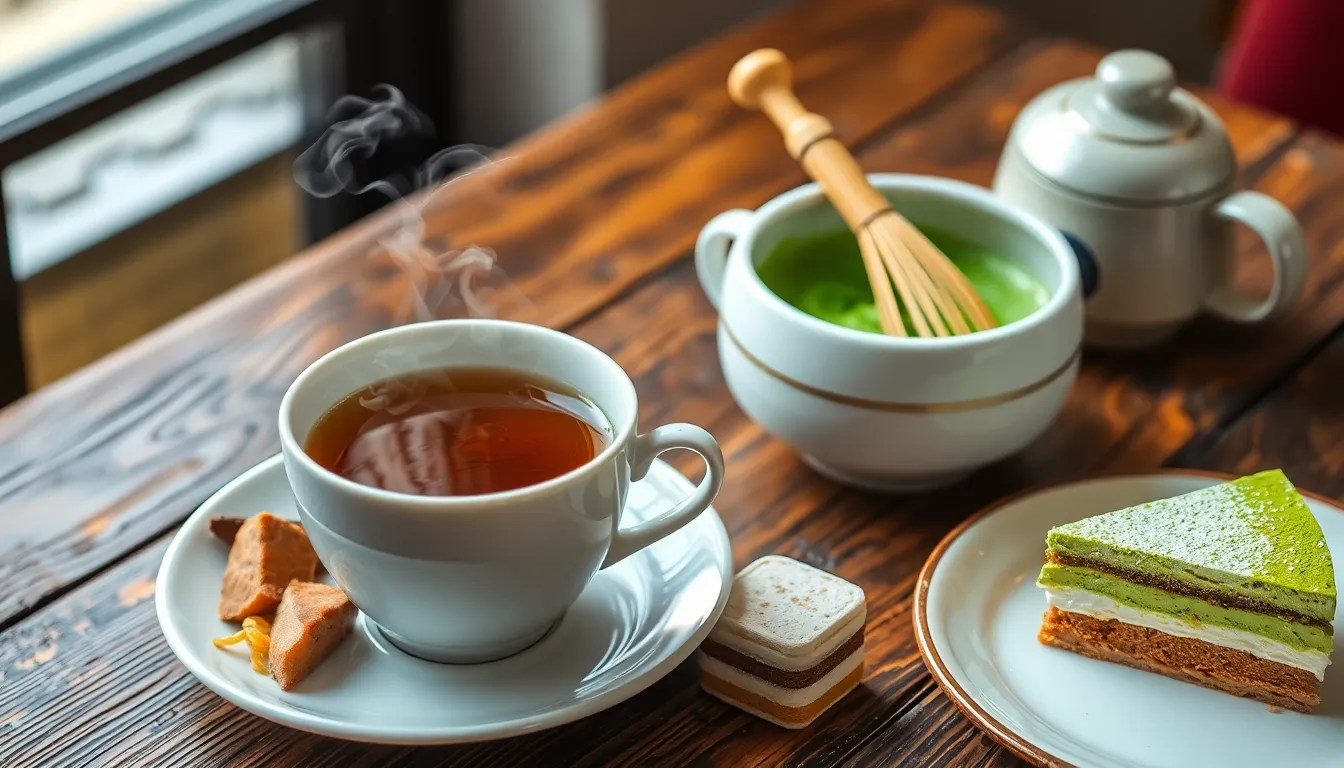
Many alternatives exist for those who don’t enjoy traditional coffee but still want similar experiences or benefits. These options provide comparable warmth, ritual, or energy without the strong taste or jitters often associated with regular coffee.
Herbal and Tea Alternatives
Herbal teas offer coffee-like warmth without caffeine, making them perfect for those sensitive to stimulants. Roasted dandelion root tea delivers a rich, earthy flavor reminiscent of coffee but with a gentler profile. Pau D’Arco and rooibos teas provide similar comforting experiences while offering their own unique health benefits.
Green tea and matcha present excellent options for those seeking caffeine without the intense jolt. These alternatives release caffeine more slowly into your bloodstream, creating sustained alertness without the crash. Matcha preparation also satisfies the ritualistic aspect many coffee drinkers enjoy, with its ceremonial whisking and mindful preparation process.
For energy seekers, yerba mate and yaupon tea serve as powerful alternatives. These South American beverages deliver natural stimulation along with distinctive flavor profiles that might appeal to those who find coffee too bitter or acidic. Both contain antioxidants and nutrients comparable to coffee while offering a different taste experience.
Caffeine-free substitutes have gained popularity among those avoiding stimulants entirely. Products like Jnantik’s Maya seed coffee provide a remarkably similar taste experience without any caffeine. Moringa powder and Crio Bru (made from cacao beans) offer rich, satisfying hot beverages that can replace coffee in your morning routine while delivering their own nutritional benefits.
Coffee in Desserts and Baked Goods
Coffee shines brilliantly in culinary applications, making its flavor accessible even to those who don’t drink it. The robust, complex profile of coffee enhances desserts by adding depth and countering sweetness with pleasant bitterness.
Tiramisu represents perhaps the most famous coffee dessert, layering espresso-soaked ladyfingers with mascarpone cream for a sophisticated treat. Coffee-flavored ice creams balance the coldness of the dessert with coffee’s warmth, creating a harmonious experience that even non-coffee drinkers appreciate.
Bakers frequently incorporate coffee into chocolate cakes and brownies, as it intensifies chocolate flavors without necessarily tasting like coffee itself. Just a tablespoon of strong brewed coffee or espresso powder can transform an ordinary chocolate dessert into something extraordinary.
Coffee extracts and espresso powders offer concentrated forms that add coffee flavor without excess liquid, making them versatile additions to frostings, cookies, and candies. These concentrated forms allow you to control the intensity of coffee flavor, making it approachable for those new to appreciating coffee notes.
Coffee-Infused Cocktails
Cocktails provide another avenue to experience coffee’s complexity in a more palatable form. These sophisticated drinks balance coffee’s intensity with complementary flavors and alcoholic warmth.
The Espresso Martini stands as a modern classic, combining vodka, coffee liqueur, and fresh espresso for a silky, potent cocktail with a distinctive foam. This drink transforms coffee into an elegant evening experience rather than a morning necessity.
Irish Coffee warms from within by blending whiskey, hot coffee, and sweetened whipped cream. The layered presentation creates a temperature contrast as you sip through cool cream into hot, whiskey-laced coffee below.
Coffee liqueurs like Kahlúa and Tia Maria offer accessible entry points to coffee flavors, mixed with cream, milk, or other spirits to create balanced, approachable drinks. These sweet, coffee-infused spirits appear in countless cocktail recipes from White Russians to Mudslides.
Cold brew cocktails have emerged as trendy options, utilizing coffee’s naturally smooth, less acidic cold extraction method as a mixer base. Combined with rum, bourbon, or amaretto, cold brew creates complex cocktails without coffee’s typical bitterness dominating the experience.
Health Benefits of Moderate Coffee Consumption

Moderate coffee consumption offers impressive health benefits even for those who don’t typically drink coffee. Research consistently shows that incorporating 2-5 cups of coffee into your daily routine can significantly improve both physical and mental wellbeing.
Reduced Disease Risk and Longevity
Coffee consumption directly correlates with a lower risk of cardiometabolic diseases. Studies demonstrate that drinking 2 to 5 cups daily decreases your risk of heart disease and early death by 15-21% compared to non-drinkers. These protective benefits apply to both caffeinated and decaffeinated varieties, making coffee accessible regardless of caffeine sensitivity. Large cohort studies have revealed that moderate coffee drinkers experience a significantly lower risk of death from all causes, including cardiovascular disease, suicide, and Parkinson’s disease. The protective effects extend even to higher consumption levels of 6-7 cups daily, though moderation remains key for most people.
Antioxidant Properties
Coffee contains powerful antioxidants that combat inflammation and oxidative stress throughout your body. These bioactive compounds interfere with disease development by neutralizing harmful free radicals that damage cells. The antioxidants in coffee play a crucial role in improving overall health outcomes by lowering your risk of chronic conditions linked to inflammation and insulin resistance. A single cup provides a concentrated dose of these protective compounds, making coffee one of the most efficient sources of dietary antioxidants available in modern diets.
Mental Performance Benefits
The caffeine in coffee enhances cognitive function in measurable ways. Your alertness, concentration, and overall mental performance improve shortly after consumption, explaining why millions rely on coffee as their morning ritual. For non-coffee drinkers, even moderate intake heightens mental energy and focus without requiring the acquired taste for stronger brews. The cognitive enhancement effect makes coffee particularly valuable during demanding mental tasks or when you need sustained attention throughout your day.
Conclusion
Entering the industry of coffee doesn’t have to be intimidating. You now have the knowledge to bypass traditional barriers and discover coffee experiences customized to your preferences. Whether through creamy lattes smooth cold brews or specialty beans with naturally mild profiles there’s a coffee option waiting for you to enjoy.
Don’t feel pressured to drink coffee the “right way” – the best cup is the one you love. Start with gateway drinks add your preferred sweeteners or explore coffee-infused desserts and cocktails. You might even find that coffee’s health benefits make it worth adding to your routine.
Remember coffee culture is about discovery and pleasure. Your perfect cup awaits – it just might look different than you expected.
Frequently Asked Questions
Why do some people avoid drinking coffee?
Many people avoid coffee due to its bitter taste, acidity, and strong aroma. Some have concerns about caffeine sensitivity or believe misconceptions that all coffee tastes the same and must be consumed black. Others feel intimidated by coffee culture or worry about potential health effects. Some also think quality coffee is expensive or complicated to prepare, creating barriers for newcomers to the coffee world.
What are good “gateway” coffee drinks for beginners?
Lattes are perfect for beginners as they combine espresso with steamed milk to mask bitterness. Flavored lattes and cappuccinos add sweetness that makes coffee more approachable. Cold brew and iced lattes offer refreshing alternatives with smoother, less acidic profiles. These drinks allow newcomers to experience coffee’s complex flavors without being overwhelmed by its traditional intensity.
Are there coffee varieties that are less bitter?
Yes! Light roasts are smoother and less bitter than dark roasts, retaining the bean’s natural flavors with vibrant taste profiles. Specialty coffee beans from regions like Ethiopia and Central America offer unique, approachable flavors that appeal to sensitive palates. These options provide a gentle introduction to coffee’s complex flavor spectrum without overwhelming bitterness.
How can I customize coffee to suit my taste preferences?
Add milk or cream to soften bitterness and enhance richness—try flavored creamers or non-dairy alternatives for variety. Incorporate sweeteners or flavored syrups to make coffee more palatable. Serving coffee over ice can diminish bitterness and create a refreshing experience. Customization is standard practice among coffee drinkers, so don’t hesitate to adjust your coffee until it suits your preferences.
What are some alternatives to coffee that provide similar experiences?
Herbal teas and roasted dandelion root tea offer warmth without coffee’s strong taste. Yerba mate and yaupon tea provide energy without jitters. Caffeine-free options like Jnantik’s Maya seed coffee and Moringa powder deliver rich flavors without caffeine. Green tea contains less caffeine than coffee while still providing a gentle energy boost and numerous health benefits.
Can I enjoy coffee flavors without drinking actual coffee?
Absolutely! Coffee enhances flavors in desserts like tiramisu and chocolate treats. Coffee extracts and espresso powders can be incorporated into baked goods for a subtle coffee essence without overwhelming intensity. Coffee-infused cocktails like Espresso Martinis and Irish Coffee balance coffee with complementary flavors, making them approachable even for non-coffee drinkers.
What health benefits does moderate coffee consumption offer?
Research shows that drinking 2-5 cups of coffee daily can lower the risk of cardiometabolic diseases, heart disease, and early death. Coffee contains powerful antioxidants that combat inflammation and oxidative stress. The caffeine in coffee enhances alertness and concentration, improving cognitive function. These benefits make coffee a valuable addition to your routine, even if you’re not a regular coffee drinker.
Is it normal to dislike coffee at first?
Yes, developing a taste for coffee is often an acquired experience. Many coffee enthusiasts didn’t enjoy their first cup but gradually appreciated its complexity after trying different varieties and preparation methods. Your taste preferences can evolve over time, and exploring different coffee options may help you discover versions you genuinely enjoy.


